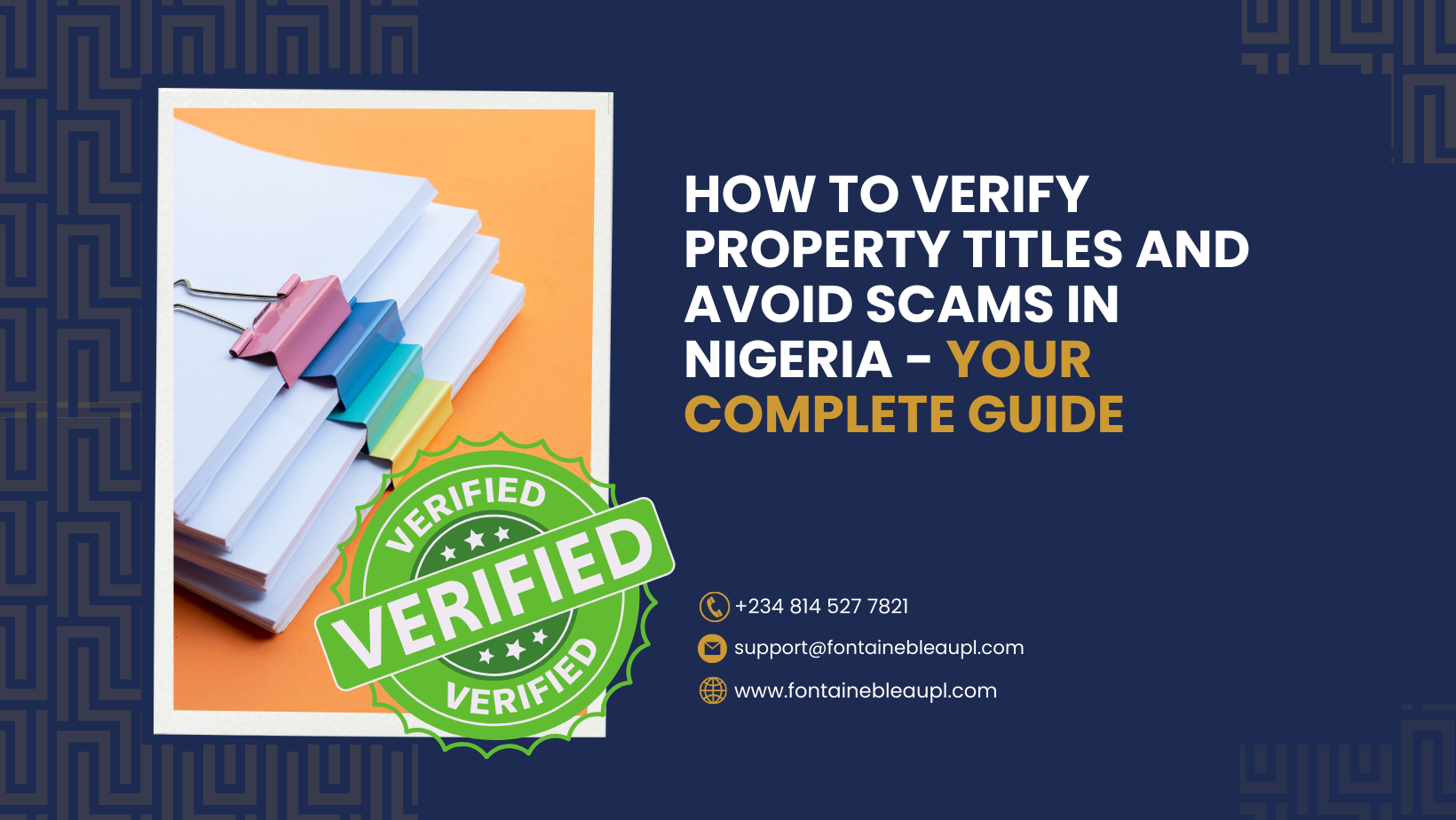Buying land or property in Nigeria can feel like stepping into a goldmine - and sometimes, a minefield. While Abuja, Lagos, and other cities are booming with real estate opportunities, fraud is also on the rise.
I once met a young professional who paid for a plot in Abuja only to find out later that the land had already been sold to three other buyers. Painful, right? That’s why knowing how to verify property titles and avoid scams in Nigeria is not just smart, it’s essential.
In this guide, we’ll break down the steps you need to follow to keep your money safe and ensure your dream property doesn’t turn into a nightmare.
Why Verifying Property Titles in Nigeria Matters
Real estate scams are common because many buyers don’t carry out due diligence. Fraudsters rely on excitement and urgency—they push you to “pay quickly” before you have time to think.
But the truth is simple: if you don’t verify the property title, you may end up buying air. A property with questionable documentation can lead to endless disputes, legal battles, or outright loss of investment.
Step 1: Confirm the Type of Property Title
Types of Property Titles in Nigeria
In Nigeria, property can come with different titles, each carrying a different level of ownership and security:
-
Certificate of Occupancy (C of O): Proves government ownership and gives you the right to occupy for 99 years.
-
Deed of Assignment: Shows that ownership has been legally transferred from seller to buyer.
-
Governor’s Consent: Authorizes that the transfer of property is valid and recognized by law.
-
Power of Attorney: Allows someone else to sell property on behalf of the owner but requires careful scrutiny.
When buying, always ask: “What title document does this property have?”
Step 2: Conduct a Search at the Land Registry
One of the most effective ways to verify property titles is through the Land Registry in the state where the property is located.
For example, in Abuja, you can confirm property details through the Abuja Geographic Information System (AGIS). This helps you check:
-
If the property is registered.
-
If it has any encumbrances (like loans or disputes).
-
If it is free from government acquisition.
Skipping this step is like signing a blank cheque.
Step 3: Cross-Check Survey Plans and Property Boundaries
Why Survey Plans Matter in Nigeria
A survey plan shows the boundaries and exact location of a property. Fraudsters often sell land outside the actual demarcated area.
Imagine buying land only to discover your house is sitting on someone else’s plot. To avoid this, hire a licensed surveyor to verify the survey plan and ensure it matches government records.
Step 4: Investigate the Seller’s Identity and Authority
Always confirm that the seller has the legal right to sell the property. If the seller is an individual, ask for valid ID and compare names on the title document.
If it’s a family land or community sale, make sure all parties agree. For corporate sellers, check the company’s registration with the Corporate Affairs Commission (CAC) to confirm legitimacy.
Step 5: Hire a Real Estate Lawyer
Property transactions in Nigeria are complex. A seasoned real estate lawyer knows how to spot red flags and handle documentation. Yes, it costs extra, but it’s nothing compared to the millions you could lose in a scam.
Your lawyer will:
-
Review all documents.
-
Conduct due diligence.
-
Draft and register agreements.
Think of a lawyer as your insurance policy against fraud.
Step 6: Don’t Ignore Red Flags
When buying property, trust your instincts. If the deal feels rushed, the price looks too good to be true, or documents appear inconsistent—pause.
Scammers thrive on urgency. A legitimate seller will not pressure you into transferring millions within hours. Take your time to verify every detail.
Step 7: Use Trusted Real Estate Companies
The Nigerian property market has many “agents” but not all are credible. Working with a reputable real estate company in Nigeria reduces your risk. Established firms usually have verified listings and transparent processes.
Common Property Scams in Nigeria
-
Multiple Sales Scam: Same property sold to several buyers.
-
Forged Documents: Fake Certificates of Occupancy or survey plans.
-
Government Land Scam: Selling land earmarked for public use.
-
Ghost Sellers: Agents who vanish after collecting deposits.
Knowing these tricks helps you stay alert.
In conclusion, Buying property in Nigeria doesn’t have to be risky. By following this guide on how to verify property titles and avoid scams in Nigeria, you’ll protect your investment and enjoy peace of mind.
You can also access our articles on 10 Critical Questions to Ask When Buying a Property in Abuja, Nigeria to learn about to make the right decision when buying property.
Ready to buy property in Abuja or anywhere in Nigeria without fear of scams? Contact us today and let’s guide you every step of the way.








(0) Comments